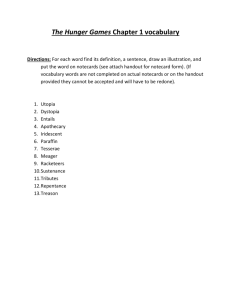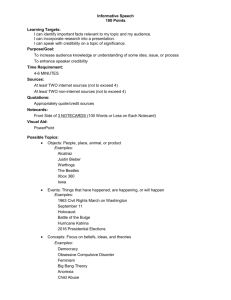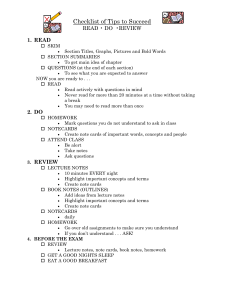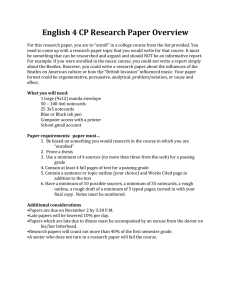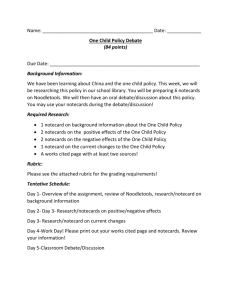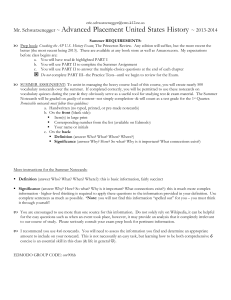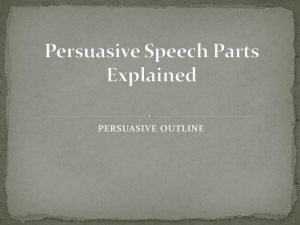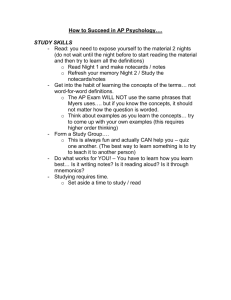File
advertisement
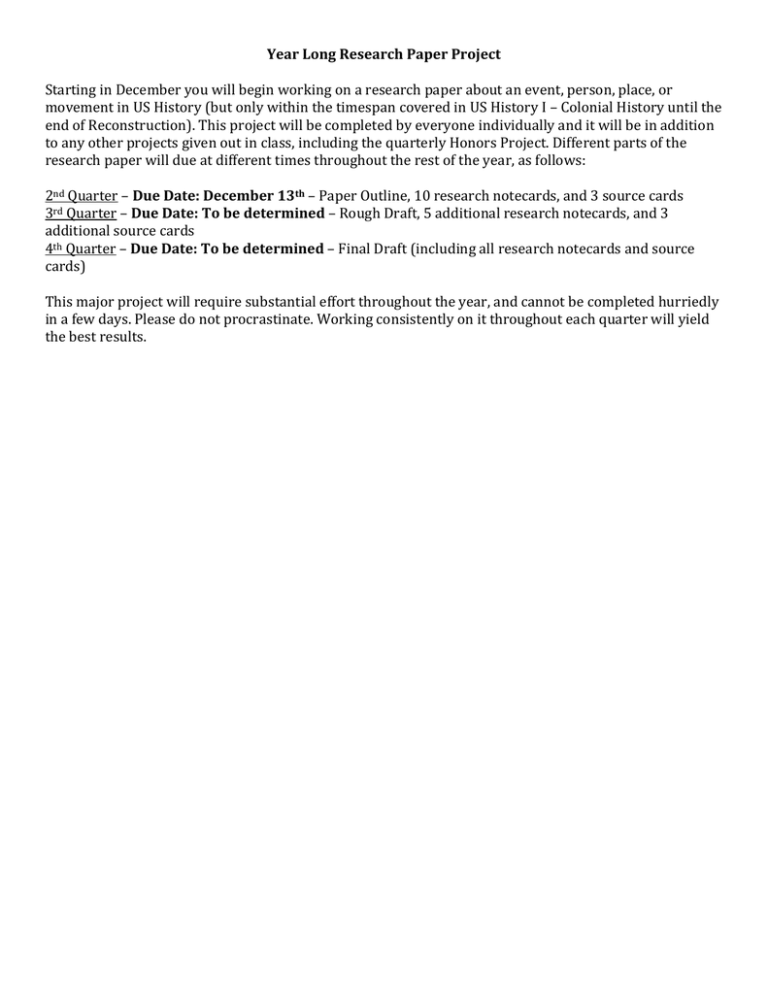
Year Long Research Paper Project Starting in December you will begin working on a research paper about an event, person, place, or movement in US History (but only within the timespan covered in US History I – Colonial History until the end of Reconstruction). This project will be completed by everyone individually and it will be in addition to any other projects given out in class, including the quarterly Honors Project. Different parts of the research paper will due at different times throughout the rest of the year, as follows: 2nd Quarter – Due Date: December 13th – Paper Outline, 10 research notecards, and 3 source cards 3rd Quarter – Due Date: To be determined – Rough Draft, 5 additional research notecards, and 3 additional source cards 4th Quarter – Due Date: To be determined – Final Draft (including all research notecards and source cards) This major project will require substantial effort throughout the year, and cannot be completed hurriedly in a few days. Please do not procrastinate. Working consistently on it throughout each quarter will yield the best results. Tue Dec 3rd Classwork: Individual Research into your topic and historical question, narrow down topic. HW: Bring a Thesis to me tomorrow to look over Wed Dec 4th Classwork: work on notecards, 5 done today HW: Work on Notecards Thur Dec 5th Classwork: work on notecards, 5 done today HW: Work on notecards 1-10 and 3 source cards due PRINTED tomorrow! Friday Dec 6th Classwork: work on revising and tightening up Thesis, Work on organizing paper outline HW: Work on notecards and Outline: due Friday 13th 2nd Quarter Research Paper Rubric: Getting Started Outline: 50 Points total I. Introduction – 10 points total A. Topic II. III. IV. V. ______/3 points B. Research Question ______/2 points C. Thesis ______/5 points Supporting Argument #1 – 10 points total Paraphrase an argument that supports your thesis (topic sentence) ______/5 points What evidence do you have to support this argument? (Notecards) ______/5 points Supporting Argument #2 – 10 points total Paraphrase an argument that supports your thesis (topic sentence) ______/5 points What evidence do you have to support this argument? (Notecards) ______/5 points Supporting Argument #3 – 10 points total Paraphrase an argument that supports your thesis (topic sentence) ______/5 points What evidence do you have to support this argument? (Notecards) ______/5 points Conclusion – 10 points total A. Restate thesis B. ______/5 points Recap of main points in you supporting paragraphs ______/5 points Notecards: 55 points total 1. At least 10 fully completed notecards ______/40 points 2. At least 3 preliminary source cards ______/15 points Total Score: ______/105 points Paper Topics: Columbian Exchange Spanish Colonization Competition between European Colonization Resistance to Colonization Jamestown Native and European Relations Indentured Servitude Colonial Slavery Bacons Rebellion Mayflower Religion in New England Pequot War Quakers Salem Witch Trials Glorious Revolution Mercantilism Triangle Trade Middle Passage Stono Rebellion Economy of Southern Colonies Economy of Northern Colonies Great Awakening Enlightenment French and Indian War Townshend Acts Sons of Liberty Boston Massacre Boston Tea Party Lexington and Concord Common Sense Valley Forge Saratoga Yorktown Articles of Confederation Shays Rebellion Constitutional Compromises Federalist vs. Anti-Federalists 1st National Bank DC Compromise XYZ Affair Alien and Sedition Acts Nullification Crisis Lewis and Clark Expedition Louisiana Purchase Marbury vs. Madison War of 1812 Industrial Revolution (North East) Jackson and the Bank Jackson and Spoils and Nullification Crisis Trail of Tears Henry Clays American System Extension of Slavery in New Territories Panic of 1837 2nd Great Awakening Abolitionism Slavery in the American South Fredrick Douglass David Walker Education reform Mental Health Reform Prison Reform Temperance movement Seneca Falls American Utopias Lowell System/Strike Market Revolution Manifest Destiny Oregon Trail Mormons California Gold Rush Texas Republic (independence) Texas Annexation Mexican-American War Underground Railroad (Herriot Tubman) Compromise 1850 Bleeding Kansas Harpers Fairy Dred Scott Lincoln, Douglas Debates Lincoln Secession from the Union Outline I. Introduction A. Topic (any notecards that introduce your topic) B. Research Question and importance of topic (write it out) C. Thesis: (Write it out) II. Supporting Argument #1 (Topic sentence, write it out) A. Textual evidence 1 (your notecard here) i. Any other sub points to make (any other notecards here) ii. Any other sub points to make (any other notecards here) B. Textual evidence 2 (your notecard here) C. Textual evidence 3 (your notecard here) III. Supporting Argument #2 (Topic sentence, write it out) A. Textual evidence 1 (your notecard here) B. Textual evidence 2 (your notecard here) IV. Supporting Argument #3 (Topic sentence, write it out) A. Textual evidence 1 (your notecard here) B. Textual evidence 2 (your notecard here) V. Conclusion A. Restate Thesis (write it out) B. Recap of main points in your supporting paragraphs i. Supporting Argument #1 ii. Supporting Argument #2 iii. Supporting Argument #3 EVALUATING SOURCES: You need to be careful when using sources of information. Judging how reliable sources of information are is difficult. When in doubt, ask people you trust to know what sources are trustworthy. Best sources of information: Books from the library shelves Databases available through the library Groups of suitable websites for research in the subject area Databases; These should be your first line of research. The sources used in these are the more recent and reliable for research. You will find magazine articles, primary sources articles, newspaper articles and writings from books. Books, Magazines and Newspapers Any print information should have current information with unbiased viewpoints and should relate to your guiding statement. Ask yourself? 1. What is the copyright? 2. Can you find 2 sources that say the same thing? 3. Is the writer respected in the field? 4. Can you verify the facts by asking a knowledgeable person? 5. Is the information based on facts or does it seem to be someone’s opinion? 6. If the source is from a newspaper or magazine, is it an opinion column, ad or a news story? World Wide Web This is a valuable source of information, but not the only source. Remember, anyone can have a website. Make sure that you are using a site that is not slanted or biased. 1. Websites that end with .gov, .us, .edu or ,mus are more credible that personal pages. These are onlines sites for educational institutions museums and the government. 2. Websites that end in .com are commercial sites. While many are legitimate, such as ABCNEWS.com, some may be trying to sell a product or opinion. 3. Beware of blogs. These are opinion sites. 4. When was the site created? When was it last updated? 5. Is the author/s well known and credible? 6. Is there a way to contact the person who developed the site? TAKING NOTES: Make sure you record the key data from your source. Use abbreviations and phrases Don’t write the same facts over and over again
